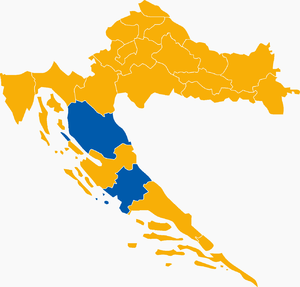2005 Croatian presidential election
| |||||||||||||||||
| Turnout | 50.57% (first round) 51.04% (second round) | ||||||||||||||||
|---|---|---|---|---|---|---|---|---|---|---|---|---|---|---|---|---|---|
| |||||||||||||||||
 Results of the second round in all of Croatia's counties: the candidate with the majority of votes in each administrative division. Stjepan Mesić Jadranka Kosor | |||||||||||||||||
| |||||||||||||||||
 |
|---|
Presidential elections in Croatia took place in two rounds in January 2005. This was the fourth such election since independence in 1991. It was the first presidential election held after the constitutional changes of November 2000, which replaced a semi-presidential system with an incomplete parliamentary system, thus greatly reducing the powers of the President in favor of the Prime Minister and his government cabinet. The incumbent president Stjepan Mesić, who had been elected in the 2000 election as the candidate of the Croatian People's Party, was eligible to seek reelection to a second term and ran as an independent because the Constitution of Croatia prohibits the President from holding party membership while in office.
The election resulted in the landslide re-election of incumbent President Stjepan Mesić, in office since 2000, to a second five-year term. It also became the first time that a woman, HDZ candidate Jadranka Kosor, took part in the runoff. The percentage of the vote received by Mesić in the second round is the highest of any president to date, as he won re-election with 65.93% of the vote, while also narrowly failing to win outright in the first round, receiving 48.92% of votes. Namely, Mesić had indeed received an absolute majority of the votes cast within Croatia itself, but the votes of Croatian citizens living abroad forced a run-off by making Mesić's percentage of the vote fall just under the necessary 50% + 1 vote threshold needed to win in the first round. Voter turnout was 50,57% in the first round and 51,04% in the second round. The first round exhibited a decline of 450.500 votes when compared to the first round of the previous election in 2000 and a 362.000 vote decline in comparison with the second round of the same election. On the other hand, the second round of this election exhibited a 435.000 vote decline in comparison with the first round of the 2000 election and a 347.000 vote decline in comparison with the second round of the same election.
President Mesić was sworn in for a second term on 18 February 2005 by the Chief justice of the Constitutional court.
Background
The Croatian State Elections Committee published a list of potential candidates on 15 December 2004. President Stjepan Mesić stood for re-election, and the governing HDZ nominated cabinet minister Jadranka Kosor. A total of thirteen candidates were accepted, each after having submitted 10,000 citizen signatures, an endorsement required by law.
Mesić won a landslide victory gaining nearly 49% of the vote in the first round, held on 2 January 2005. He only narrowly missed the 50% target for an outright win, with Kosor trailing with 20% and a surprising independent candidate Boris Mikšić with 18% of the vote. The elections went to a second round held on 16 January 2005 in which Mesić and Kosor were the only candidates. This time, Mesić won an overwhelming majority with about 66% of the vote against Kosor's 34%.
Results
-
Stjepan Mesić independent candidate supported by left-wing political parties
-
Jadranka Kosor candidate of the Croatian Democratic Union
-
Đurđa Adlešić candidate of the Croatian Social Liberal Party
Template:Croatian presidential election, 2005
Analysis
Most polls before the first round were predicting the incumbent president Stjepan Mesić would be reelected without a runoff, securing 50% + 1 vote.[1] However, Jadranka Kosor benefited from the votes coming from the citizens living abroad, which narrowed the president's victory by only a couple of points, but enough to secure a second round. The greatest surprise of the election was the independent candidate Boris Mikšić, a Croatian businessman and entrepreneur living in the United States. His campaign was heavily based on the message of a 'Croatian dream', similar to the American dream he said he achieved during his career in the US. On the night of the election, the first exit polls indicated president Mesić might secure a second term without the need of a runoff, while Kosor and Mikšić were shown battling for second place.[2] As the first results started coming in it was evident that Mesić was not going to secure 50% + 1 vote and that a runoff is inevitable. As votes from the citizens living abroad were tallied, Kosor overtook Mikšić, placing second and qualifying for the second round. The campaign began immediately the next day and during the two-week-long campaign, three presidential debates were held, one on each of Croatia's three major television networks. Despite most observers and post debate polls indicating Kosor won the debates, Mesić maintained his lead in the polls. As Election Day neared, the Kosor campaign exceeded all previous campaign spending records, trying to motivate the conservative base.[3] On Election Day, as polls around the country closed at 7 pm, all television networks announced Mesić won a landslide victory based on the exit polls, which official results later confirmed. Kosor conceded and congratulated Mesić on his victory. After the elections, Boris Mikšić claimed the elections were fraud and that Mesić and Prime Minister Ivo Sanader made a deal of "bringing" Kosor in the second round. He claimed to have received 15,000 election ballots with serial numbers that were not evidented.[4]
References
- ^ "Jutarnji list i Mediana: Bandić treći, a još se nije ni kandidirao". Jutarnji list (in Croatian). 19 September 2009. Retrieved 11 November 2009.
- ^ "Prema zadnjim projekcijama izbornih rezultata Mesić uvjerljivo vodi". Index.hr (in Croatian). 2 January 2005. Retrieved 11 November 2009.
- ^ "Kosor u prvom krugu potrošila najmanje 8,7 milijuna kuna". Index.hr (in Croatian). 8 January 2005. Retrieved 11 November 2009.
- ^ http://www.vecernji.hr/predsjednicki-izbori/b-miksic-mesic-i-sanader-dogovorili-su-2005-da-u-2-krug-ide-j-kosor-68180





